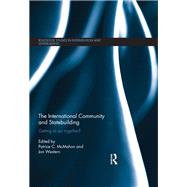- ISBN: 9780415695398 | 0415695392
- Cover: Hardcover
- Copyright: 1/26/2012
This book brings together policymakers and academics to analyse the international community'¬"s performance in post-war statebuilding projects. The authors are particularly interested in the disconnect between academic theories and writings on statebuilding and the experiences of practitioners on the ground. This is because much of the existing literature focuses on broad strategic considerations about what works and does not work in terms of restoring security, building new state institutions, and promoting stable economic growth. Yet, for many practitioners, the problem is not one of identifying what is needed, but how a disparate community of international organizations, with varying objectives, resources and levels of interest can translate strategic goals into specific executable policy instruments. In an effort to bridge this gap, this volume discusses in detail why various international actors, including the United States, the European Union, and NATO, became involved in statebuilding efforts and how they have developed and executed their policies in the Balkans, Iraq, and Afghanistan. The central concern of this volume is to demonstrate that despite the obvious failings and unintended outcomes of contemporary statebuilding efforts, international actors rely on a variety of means to coordinate with other international and domestic actors. While far from perfect, the international actors are learning and adapting; in sentence, the international community is getting its act together. Yet, as most of the contributors acknowledge, statebuilding is inherently a difficult proposition; there are many '¬Smoving parts'¬ and there are structural as well as human impediments that stand in the way of success. By examining the experiences of the Balkans, Iraq, and Afghanistan, the chapters explore different aspects of how international state builders negotiate the intersections of multilateralism, competing strategic priorities and agendas, organizational complexity, and domestic politics. This book will be of much interest to students of statebuilding, peacebuilding, war and conflict studies, and International Relations in general.






